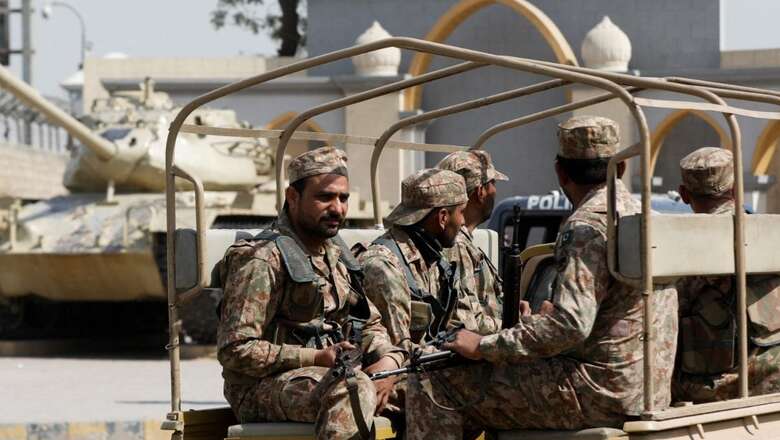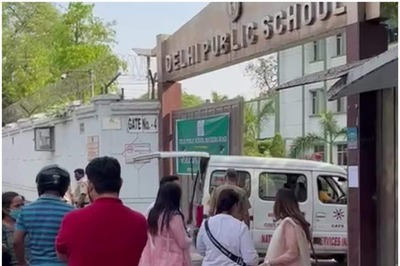
views
Pakistan has urged the United Nations to conduct a thorough investigation on how the banned Tehrik-i-Taliban Pakistan (TTP) terror group acquired sophisticated military equipment left behind by “foreign forces” in Afghanistan.
Drawing attention to several terrorist groups that are operating from neighbouring Afghanistan, Permanent Representative of Pakistan to the UN, Munir Akram on Wednesday said, We have lost hundreds of our brave soldiers and civilians in these attacks just this year alone and last week, TTP affiliated group carried out a heinous attack on our security personnel in Dera Ismail Khan, resulting in the loss of more than 23 precious lives.
Six terrorists linked to Tehrik-e-Jihad Pakistan (TJP), a newly formed militant group that is an affiliate of the TTP, rammed an explosive-laden truck into the security post in Dera Ismail Khan in the South Waziristan tribal district in Khyber-Pakhtunkhwa province on December 12, killing 23 soldiers.
Akram was speaking at the United Nations Security Council’s UN Assistance Mission in Afghanistan (UNAMA) briefing on the topic of Situation in Afghanistan’ prepared by Special Coordinator Feridun Sinirlioglu (Turkiye).
He said the TTP and its affiliates have carried out a series of organised cross-border terrorist attacks on his country’s soil, evidently under the protection of the interim Government.
These attacks have become more lethal and sophisticated since the TTP terrorists have acquired and used advanced military equipment. These weapons obviously originate from the considerable stocks left behind by foreign forces. Yet, the question is: how did the TTP a listed terrorist organisation secure these weapons? Akram was apparently referring to some of the American weapons that were left behind by the US military in Afghanistan after the US completed its withdrawal from the war-torn country in August 2021.
Akram then said Pakistan demanded that the United Nations whether UNAMA or another agency conduct a thorough investigation to elicit how these weapons got in the hands of the TTP and to identify ways of retrieving them. UNAMA is the United Nations Assistance Mission in Afghanistan (UNAMA), whose Secretary General Roza Isakovna Otunbayeva, said that there must be more direct engagement with the de facto authorities, including in Kabul.
Meanwhile, Ramesh Rajasingham, Director of Coordination of the United Nations Office for the Coordination of Humanitarian Affairs (UNOCHA), said that more than 20 million people require humanitarian assistance in Afghanistan after the October quakes, and also mentioned the Afghan nationals repatriated from Pakistan. Following three earthquakes in October in Herat, thousands of families are now living in tents and makeshift shelters, exposed to fast-falling winter temperatures. The eastern and southern regions have, meanwhile, seen a dramatic surge in the number of Afghans returning from Pakistan, following that country’s decision to send back undocumented Afghan nationals, Rajasingham said.
The UN official was referring to the mass exodus of Afghans returning to their home country after Pakistan threatened them with a deadline. An estimated 1.7 million Afghans had been living in Pakistan when authorities announced its nationwide crackdown, saying that anyone without proper documents had to leave the country by October 31 or else get arrested. However, even as hundreds and thousands of Afghan nationals made a beeline to exit Pakistan, amidst mounting international pressure, Pakistan on December 13 extended the deadline for the repatriation of Afghan nationals without proper documents and waiting to relocate to Western countries till February 29.
Akram, the Pakistan representative at the UN, went on to claim that his country has paid an enormous price for 40 years of generosity to Afghanistan and said, (we) have been hosting 1.4 million registered refugees with little or no support from the international community. He said that there were another 2.2 million Afghans, who are undocumented and illegally present in Pakistan, including 7,00,000, who crossed into Pakistan after the Taliban takeover in August 2021.
Besides the security threat posed by terrorist sleeper cells’, many of the illegal refugees are involved in drug trafficking, and operated property mafias and other crimes,” Akram said. The inflow of such large numbers had hurt Pakistan’s economy and jobs market, he said, adding that peace in Afghanistan is a “strategic imperative” for Pakistan.
















Comments
0 comment